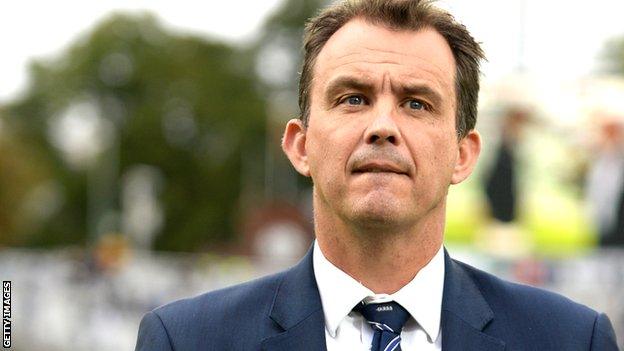Tom Harrison: ECB pledges £60m amid 'biggest challenge in its history'
- Published

Tom Harrison has been ECB chief executive since 2015
The England and Wales Cricket Board is facing the "biggest challenge in its history", said chief executive Tom Harrison as he pledged £60m of support to counties and clubs.
No cricket will be played in England until at least 28 May because of the coronavirus pandemic.
The 18 first-class counties will share £40m, with £20m in interest-free loans made available to grassroots clubs.
England's players will not be asked to take a pay cut.
Harrison, who will take a pay cut, said the financial package will "give certainty in these extremely difficult times to keep the lights on".
However, he warned that it "will be months before the full financial fallout is made clear".
The £40m is made up of three months of funds released early to help the "immediate cash flow challenges" faced by counties and county boards.
It also includes two years worth of "facilities maintenance distribution" which no longer have to be spent solely on improving facilities.
The County Championship was due to start on 12 April, with England's first Test of the summer against West Indies scheduled to begin on 4 June.
The ECB said last week that it is considering playing international matches behind closed doors and introducing coronavirus checkpoints at grounds.
"We won't play until we know it is safe," said Harrison on Tuesday.
The T20 Blast - the domestic 20-over competition - is set to begin on 28 May, while the inaugural Hundred - a new 100-ball competition - is due to run from 15 July to 14 August.
"We will be prioritising the most valuable forms first," said Harrison.
"This includes the international games, T20 Blast and maybe The Hundred as and when we get there."
Alec Stewart, the former England captain and current director of cricket at Surrey, said last week that the Blast and The Hundred may be the only county cricket played this summer.
Analysis
Cricket correspondent Jonathan Agnew
This money will come as a godsend to every level of cricket, from the counties to grassroots, none of whom have any idea what the summer season might bring.
Although it is looking increasingly unrealistic, the ECB still hopes to begin the season at the beginning of June.
However, other options, such as starting as late as August, are being modelled.
Such a late start would have massive implications for the season and not least the launch of The Hundred, which is a key part of the £1.1bn rights deal which starts this year.